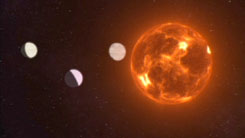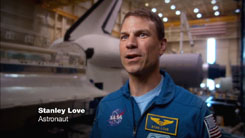The DVD packaging and menus label this episode as "Alien Solar Systems",
but the on-screen title is just "Solar Systems".
"This is how solar systems work." Narrator Mike Rowe immediately introduces
this episode in a way that disappoints those of us who are eager to learn about
solar systems outside our own, and instead sets the episode up to be a long
talk about what an orbit is, drawn out to 45 minutes. Holy mackerel, they really
don't know where their audience's interest lies! And their packaging seems to
have made a promise on which their episode can't deliver.
However, the episode turns out to be not too bad as it continues,
and in the end proves to be more fascinating than
episode 5 "Planets".
Interesting topics discussed include Pluto's demotion from its prior
status as a planet, and what the rest of the Kuiper Belt is.
There is also a really fascinating speculation about
Uranus and Neptune swapping places after their formation.
The section about Jupiter acting as a bodyguard for the inner planets
against rogue objects is neat, but surely Jupiter wouldn't be in just the
right position in its orbit to shield us 80% of the time or so, which never
seems to get addressed anytime this idea comes up anywhere.
Sadly, this episode is VERY thin on information about exoplanets, despite
interviewing some of the foremost authorities on the subject.
The Gliese 581 system is mentioned, and reported as being only 20 light-years away.
It is said here to have four rocky planets, and the episode gets excited about two of them,
but it won't ever denote which is which while doing so. Very confusing, as I
have a chart on my computer from 2010 listing 6 planets in the Gliese 581 system,
all orbiting closer than Earth does to its sun.
No other specific extrasolar system other than Gliese 581 is mentioned anywhere
in the episode. Fairly disappointing.
As this program was made, the year was 2010, and
the exoplanet count had gone over 420, up 20 from 2 episodes ago.
|
Buried on the inside disc cover:
Is our solar system unique? Since the first discovery of a planet orbiting another star, some 280 alien
solar systems have been identified. It's only by looking at solar systems far beyond our own that
we can understand how remarkable our universe is.
|
|
Participants include:
|















